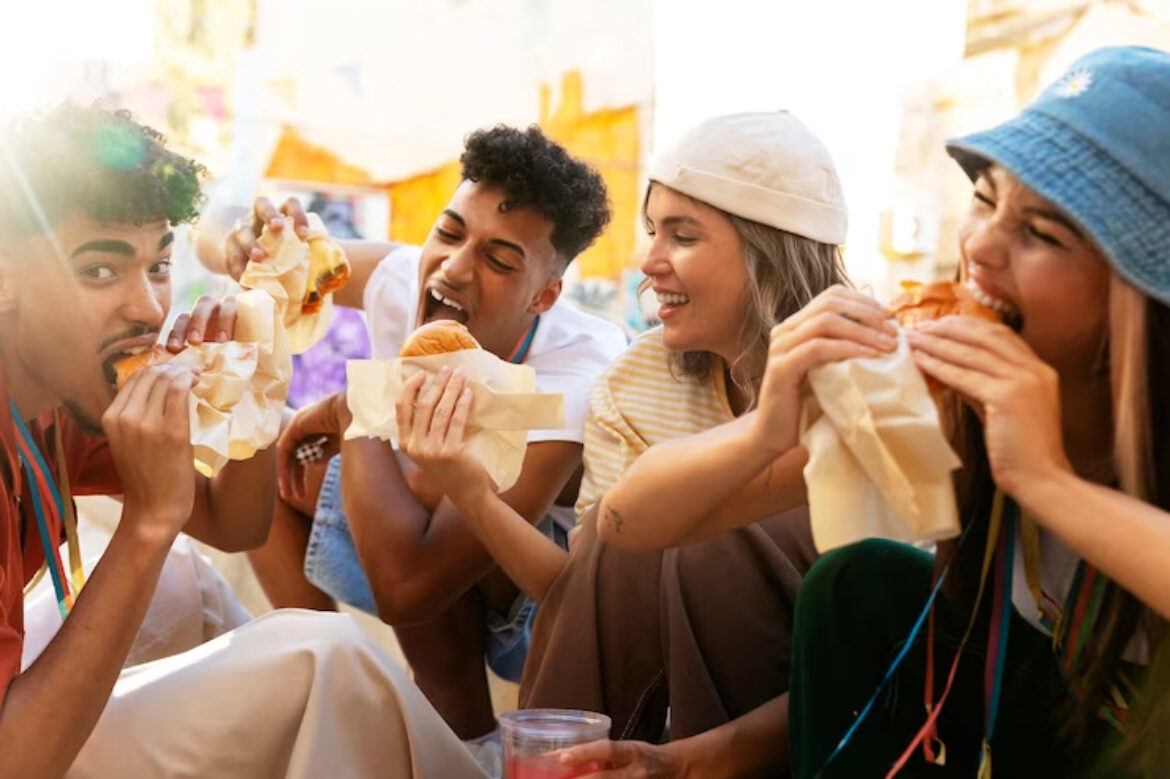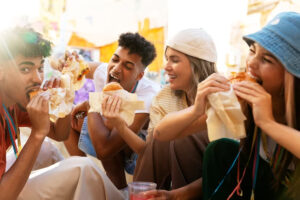Pancake Race (Olney, London, UK)
Every year on Fat Tuesday, all Londoners are lured outside like a magnet by the smell of freshly baked pancakes, which literally float throughout the city. No, this is not a mistake and you read everything correctly. One day in 1445, in the town of Olney in southeastern England, one of the church parishioners was baking pancakes on Fat Tuesday, contrary to the rules of fasting. Hearing the bell ringing and coming out of the “pancake trance,” she immediately ran to church to atone for her sins, but it was still not easy for her to part with the pancakes (and she can be understood), so the lady turned the last one right on the go. The people of Olney were so amused by this spectacle that they turned it into a tradition.
Today the Pancake Race takes place in both Olney and London. The conditions are as follows: the one who runs the fastest and at the same time turns the pancake in the frying pan the most number of times will receive the bell ringer’s kiss. By the way, in Westminster such races are held among members of parliament and lords. If you need some extra money for travelling around the world and taste different food – you may quickly earn them in casino – for example, www.avalon78.com/en-CA.
International Black Food Festival
The festival was first held in 2016 in Budapest, then Tel Aviv, Berlin and Helsinki joined. Finland could not miss such an event, because they love the color black: it was in this country that licorice gained popularity, here you can find ice cream with tar, and the Finns drink 10 cups of coffee, black as night, a day. Anyone can apply to participate in the festival if they want to show (and let guests try) their new culinary achievements. There is only one condition – the dish must be black without adding dyes. Black pancakes, black cakes, black cocktails, black fruits and vegetables, black fast food – all these and many other black masterpieces can be tasted at the festival.
Lobster Festival (Los Angeles, USA)
Not every city can boast that its territory hosts the largest lobster festival in the world. But Los Angeles can, because in 2009 this holiday was included in the Guinness Book of Records as the record holder in the category “Largest number of seafood dishes in an open air.” The heart of the September Lobster Festival is the port of San Pedro, but, oddly enough, lobsters are not caught here – the fresh catch comes from Maine. In addition to delicious and inexpensive lobsters and many other seafood, music and pirate shows, visitors will find the most unexpected entertainment. For example, the “Lobster Parade” is an unforgettable spectacle: happy and proud owners walk down the street in the company of their pets dressed in crustacean costumes, and the spectators squeal with delight and tenderness (one can only sympathize with the dogs).
Ice Cream Festival (Florence, Italy)
In spring, the capital of Tuscany turns into a real paradise for ice cream lovers. Every year in April or May, the best gelato producers not only from Italy, but also from all over the world demonstrate their skills in the city squares. Over the course of five days, about half a million people attend various conferences, presentations and competitions dedicated to ice cream. In special “laboratories” master classes are held on making ice cream, granita and sorbet using only fresh products. Here you can try the most delicious and high-quality ice cream, prepared accordWatermelon Festival (Chinchilla, Australia)
The Australian town of Chinchilla has for several years now held the proud title of the “watermelon” capital of Australia: about a quarter of the country’s total watermelon crop is grown here. Every two years, the city authorities organize the Chinchilla Melon Festival, a watermelon festival in Chinchilla, and the streets of the city are painted a rich red color. The festival welcomes about 15,000 guests, who are invited to take part in the most fun “watermelon” competitions: a competition for the best watermelon helmet, skiing competitions (skis, of course, need to be made from watermelons), throwing watermelons at a target, watermelon basketball and much more. During the festival, more than 20 tons of fruits are destroyed.
Coopershild Cheese Race (Brockworth, England)
On the last Monday in May at 12:00 local time, the annual Cheese Race takes place on Cooper’s Hill as part of the Spring Festival. For residents of the village of Brockworth, this event is traditional, and in recent years people from all over the world have come to run for cheese. This custom has been around for hundreds of years; according to one version, people thus confirmed the right to use communal lands for grazing their herds.
So what are the rules? Participants climb to the top of the hill and wait for the signal. Then a wheel of Gloucester cheese is allowed to roll down the hill, after which all participants rush. The one who crosses the finish line first and catches the cheese receives it as a prize. Several ambulances and a rescue team are on duty at the foot of the hill. There were cases when runners received serious injuries: they broke their backs, necks, arms, legs, ribs, and often suffered a concussion. Sometimes, when participants fell, they also injured spectators. Therefore, in recent years, wheels of cheese weighing no more than 5 kilograms have been used for racing.ing to traditional (and not so traditional) recipes (from strawberry fruits, from beer, with truffle, myrtle, mint and grapefruit).
Night of the Radish (Oaxaca, Mexico)
The city of Oaxaca is famous for its woodcarving masters, and on December 23, viewers have a unique opportunity to look at incredible carved radish sculptures. The first festival took place in 1897, but over time the event only gained popularity. During Radish Night, you can see animals, people, various architectural structures, costumes and fruits carved from radishes here. The exhibition features both radish masterpieces by professional woodcarvers and statues made by ordinary fans of this root vegetable.
Watermelon Festival (Chinchilla, Australia)
The Australian town of Chinchilla has for several years now held the proud title of the “watermelon” capital of Australia: about a quarter of the country’s total watermelon crop is grown here. Every two years, the city authorities organize the Chinchilla Melon Festival, a watermelon festival in Chinchilla, and the streets of the city are painted a rich red color. The festival welcomes about 15,000 guests, who are invited to take part in the most fun “watermelon” competitions: a competition for the best watermelon helmet, skiing competitions (skis, of course, need to be made from watermelons), throwing watermelons at a target, watermelon basketball and much more. During the festival, more than 20 tons of fruits are destroyed.



